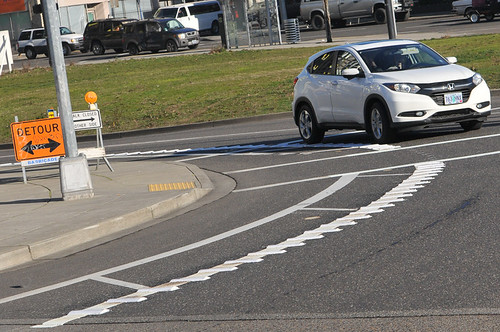
(Photos © J. Maus/BikePortland)
Oh, if we could just get people to not drive in bike lanes. We’ve tried nearly everything (except for concrete barriers): First there was white paint, then blue paint, then green paint, then parked cars, then more white paint, then flexible plastic bollards, then solar-powered LED lights. And now Portland’s Bureau of Transportation is testing ‘rumble bars’.
The new bars have just been installed on the infamous s-curve on NE Couch as it approaches the east end of the Burnside Bridge. They’re about a foot wide, spaced a foot apart, and stand about one-inch high. PBOT has installed them only on the curved portion of the Couch bike lane — a segment of roadway that has raised bike safety concerns since the day it opened.
In April 2010 we reported how the curves encouraged people operating cars and buses to encroach dangerously into the bike lane. After a crash involving a bicycle rider, PBOT realized they’d made an error in the striping design and would work to fix it. After widening the bike lane and adding a buffer a month later, the Bicycle Transportation Alliance said the bike lane was still a safety risk. In 2013, PBOT installed solar-powered, LED lights inside reflectors that were embedded into the pavement. Those lights have since been torn out.
Fast forward to today’s new installation. “PBOT noticed that the outside buffer stripe had been worn away by people who were driving taking the corner too sharply,” said PBOT spokesman John Brady. “This gave us the opportunity to test a new rumble bar to give people who are driving an audible warning and vibration when they encroach into the bike lane.”
Advertisement
I stopped by today for a closer look. The new rumble bars are indeed quite loud. I know that because the majority of people who drove by them plowed right over them. For some reason people really like to shave the angle of the curve and not even a loud noise and vibration will stop them.
Here are some more photos:
Brady says PBOT is also installing these new rumble bars on North Greeley and Interstate. That location also has a troubled past: It’s where post office worker Mike Cooley was struck and paralyzed by a hit-and-run driver as he rode home from work in 2013. PBOT is currently facing a $21 million lawsuit in that case.
Funding for the rumble strips came from PBOT’s Missing Links program, the same small pot of money ($50,000 – $100,000 per year) dedicated to bikeway improvements that funded the new flexible posts on SW 13th and Clay.
— Jonathan Maus, (503) 706-8804 – jonathan@bikeportland.org



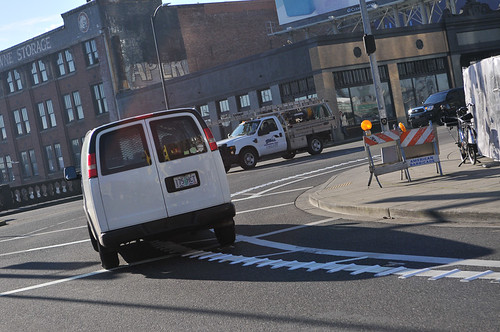
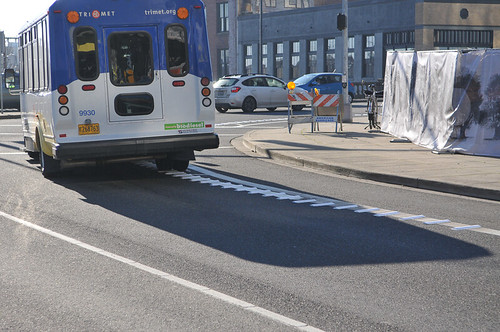
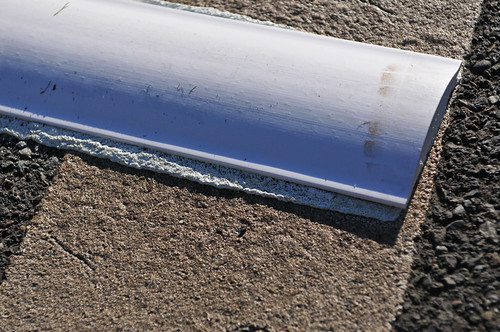
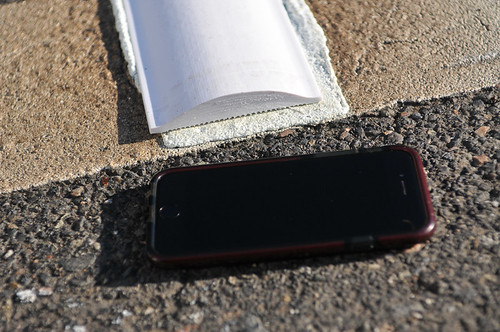
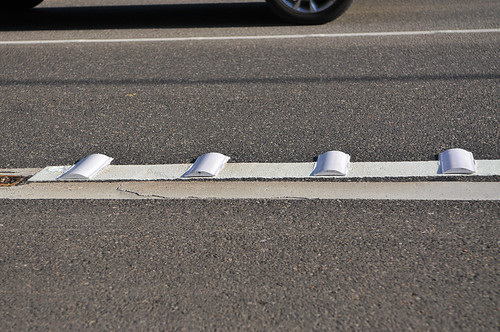
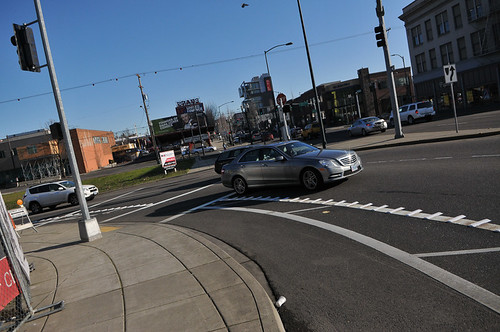
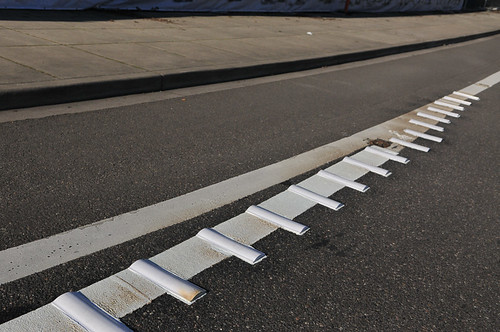
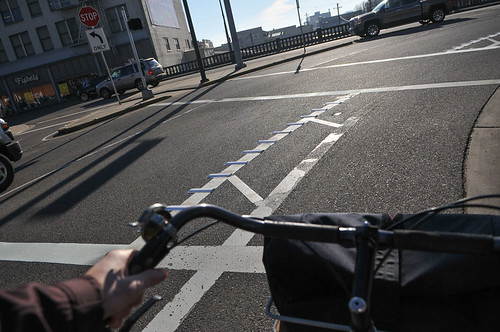
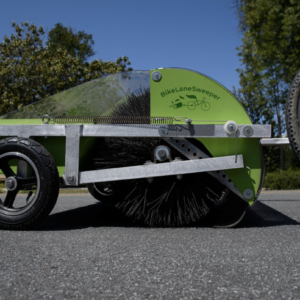
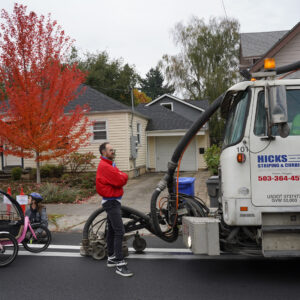
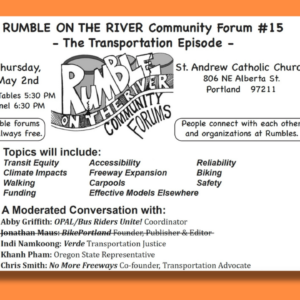
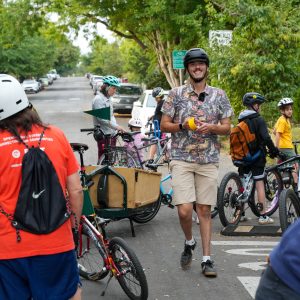
Thanks for reading.
BikePortland has served this community with independent community journalism since 2005. We rely on subscriptions from readers like you to survive. Your financial support is vital in keeping this valuable resource alive and well.
Please subscribe today to strengthen and expand our work.
👍👍
this absolutely drives me nuts. how can people (americans) drive so poorly that they cannot maintain their lanes? it boggles the mind. the rumble strips are a start, but a jersey barrier would actually teach people to drive through their pocketbooks.
“how can people (americans) drive so poorly that they cannot maintain their lanes?”
Simple answer is they don’t care.
A better answer is our society promotes constant distraction, car manufactures promote reckless “thrill seeking” driving.
People have been programmed since the day they learned to drive that it is not only acceptable but cars are designed to offer complete distraction.
“Are you not entertained?!” No? then here is navigation, music, WiFi, DVD players for the “passengers”, 100 buttons to press, sound dampening to lull you into oblivion, “hands free” texting and calls, heads up display and perfect temperature control.
Now sit back and relax in your 15 point adjustable bark-o-lounger bucket seat.
You think they don’t care? You should see China.
Great idea spencer! The only reason people have a problem staying their lane is because they want to drive too fast! This curve is treated like an acceleration on-ramp to the bridge. I would LOVE to see jersey barriers dropped on to the buffer to “encourage” people to stay in their lane!
North Interstate could use some rumblestrips/Jersey barriers between Larrabee and Russell.
I believe people cut the corner because it is more comfortable to do that. The sharp turns of the curve are not pleasant, and cutting over smooths the ride. I do not think this has anything to do with driver distraction (at least not in the general case).
I think a more formidable physical barrier is the only thing that will fix the problem. These rumble strips will not do the trick, and may even make the problem worse if drivers straddle them as they did in the photos.
I agree that cutting the corner is more comfortable if you are going 30+ mph and accelerating. Drive it as a consistent 25-30 mph (w/o accelerating) and you can very comfortably stay in your lane.
Maybe, but since people are driving it at 30+ and accelerating, the issue is somewhat academic.
Hence the suggestion for jersey barriers instead of little bumps! If added, people driving WOULD stay in their lane and drive more slowly!
people are not cutting the corner going over 30- the truth is most cars are going 25mph. And cars are not accelerating through the curve- simply put they are just cutting the corner while trying to hold their speed.
I drive that in my car and ride it in my bike and i really dont see people accelerating in the curve, most struggle to maintain their speed and those that cut the corner are just not smart drivers.
it’s a 25 mph zone, but the corner has a suggested 15 mph limit… I suspect many people are going a lot faster than 15 mph through those curves…
People drive like this because they don’t care. There are no consequences to their actions. It is ingrained behavior and how do we change bad behavior?
Education. Training and positive reinforcement.
“You can beat a dog for pooping on the carpet but he has no idea why your beating him. but if you train him, give him positive reinforcement to poop outside… he will always remember that.” And yes you can teach an old dog new tricks!
traffic problems stem from ignorance that’s the bottom line. Driver education will solve the majority of most conflicts on the road, The DMV ask’s people a few questions about signs and makes them parallel park and then “here ya go, your licensed!” Road engineers have to design roads around this idiotic logic.
This is what needs to change, drivers should be tested often, given real world scenario’s during testing. Teach them how to be responsible drivers! Train them to drive properly and reinforce it positively and it will become habit.
We can change road designs, build walls, put up signs everywhere and have cops on every corner but it won’t change people’s habits and routines. Just like the dog pooping on the carpet, if we don’t change those habits they will try and get away with it. Knowing the whole time they are going to eventually get in trouble for pooping on the carpet, but when they do get in trouble they don’t know why.
I do like the analogy of cars in a bike lane being like a dog pooping on the carpet. They are both repellent, although the dog would seem to have the higher moral ground.
Every time we come with new bikey improvements for road safety I wonder where the mandatory annual driver refresher training is.
WE know what the green paint is, a sharrow, a neighborhood greenway and all the others.
Most drivers just see pavement and the basic traffic control devices they have to obey so they don’t get a ticket. People not part of active transportation circles or from outside Portland’s bubble have very little familiarity with our unique road markings and signs.
Without constant driver training we can only expect anarchy.
Of course there’s also the problem that most Oregon drivers never had formal training even once.
They don’t think they are driving poorly, on the contrary, they think they are picking a line to minimize G forces while maintaining speed. They think they are superior drivers.
The answer is: because there is literally no penalty for doing so. Penalty for speeding? None, because you won’t ever get caught. Penalty for blowing stop signs? Zero. Who’s gonna stop you? Talking on your phone? Looking in the back seat? Applying makeup? All fine, because cops are too busy pulling over kids for DWB.
Stop wasting money on “fixes” for this area and just install a concrete median. It works.
Those spikes are going to need to be a lot less round and a lot more pointy if they’re going to stop cars.
A better solution on the inside of curves is to raise the bike lane to the height of the curb.
That works too.
im glad that odot keeps trying things on this curve. great work
Then instal tire shredders on the curb to the bike lane?
To paraphrase a popular quote:
“You can always count on PBOT to do the right thing – after they’ve tried everything else.”
A really good candidate for these would be the bike lane South bound on NE 12th ave where it corners around E Burnside St onto SE Sandy BLVD
PBOT please use these rumble bars often, the more that are out there the more drivers will be annoyed by them!
Came here to say the same thing. I use this bike lane a lot, and I’ve literally rubbed my shoulders or arms against the side of cars who absolutely knew I was right next to them (because we were both just waiting at a red light together) but didn’t give a fuck about making sure I had space as they took that curve.
I dearly wish we could do something similar on Lombard just before the railway cut:
https://www.google.com/maps/@45.5804581,-122.7383089,3a,15y,309.25h,88.12t/data=!3m6!1e1!3m4!1sO4auDgB-asfeAZwxEdXVNQ!2e0!7i13312!8i6656
The travel lane narrows, as does the bike lane, right at the apex of the curve. To make matter worse, there’s a deep storm drain that takes up most of the bike lane right at the most narrow point!
Regarding the effectiveness of these, I don’t expect they’ll help much, unless PBOT elects to make them explode on contact.
The bumps present a hazard to cyclists, but only a minor annoyance to drivers. Maybe it is ironic symbolism for how drivers are an deadly hazard for cyclists, but cyclists are an unacceptable annoyance to drivers.
Has anyone ever been issued a ticket for driving in the bike lane? I know cyclists have been ticketed for riding in the lane.
Outer ring: rumble strip.
Inner ring: caltrops.
The problem will solve itself.
/sarcasm
I was just about to suggest caltops for the outer ring… and for every double-line do-not-cross type of pavement marking…
hah, I had to look it up. 🙂

These are an absolute hazard to cyclists, I can’t believe PBOT actually thought it was a good idea to install them, and that there are cyclists here praising that unbelievably bad decision.
How are they a “hazard to cyclists?” around a mellow curve on the outside of a very wide bike lane that has a buffer between the bike lane and the rumble bars. its well lit 24/7 and the sight lines are very clear.
If any rider can’t negotiate a bike lane with rumble strips on the outside then how will they deal with bollards, K rails or concrete median? A bike tire can easily roll over and through these rumble strips allowing the rider time to correct their path… a concrete median or just about any other kind of structural separation would stop a bike dead (no pun intended) if the cyclist hits them.
Next time you find that bike lane full of gravel or ice after a winter storm, or you just need to avoid the dead raccoon or the passed out homeless person in the bike lane, you will find out that crossing those rumble strips on a bike is indeed a hazard.
Cyclists nationwide have fought against rumble strips on highway shoulders for years, and now here’s a bunch of Portland cyclists actually welcoming them, OMFG.
Once again I ask; then what will you do if there is a concrete barrier, curb or bollards there?
Are you going to enter that curve at a speed that you can stop or go around an obstacle inside the space allowed? Or are you going to ride out of control and swerve into the concrete barrier?
If you enter a curve at a speed that you can’t slow or stop to navigate loose gravel, a dead homeless person or a passed out raccoon then you need to learn how to ride because even beginner commuters know how to handle that sitch.
So is the Maintenance Bureau going to de-ice that bike lane when they de-ice the adjacent motorist lane? Because they didn’t do a very good job of that in the recent freezing weather. And are those rumble strips going to interfere with clean up of the gravel in the bike lane after a winter storm?
I don’t think PBOT really thought this through fully, and if you think that every cyclist riding here is skilled enough to avoid every hazardous situation that might present itself, big LOL (but congrats on being a super-skilled cyclist yourself).
Really, the first and biggest mistake PBOT made here was to build this dangerous curve as part of the unnecessary couplet project; it’s been a problem ever since, and the only real beneficiaries of that initial project are the developers building in the area now. Anything they try to do to fix it, including installing fixed barricades, is nothing more than a band-aid solution.
My feelings as well. Burnside now only carries half the traffic, but still plenty of lanes.
Burnside and Couch are magnitudes better to drive on and bike on since the couplet was created AND it is now possible to easily cross these streets as a pedestrian. The reason this is benefiting developers is because the street has become many times more livable and is now more valuable for businesses. The S-curve could have been designed better. Maybe a T-intersection with a stop sign prior to entering Burnside would be better? I prefer the sharp curves to a slip-lane/acceleration lane design that promotes speeding, I just think some modification is required to keep people in their lanes at a slower speed.
If a cycle track is properly designed, you won’t ever have to leave it.
There are an amazing number of BikePortland readers that are more than willing to give up their freedom to use the roads for perceived safety. This blog has become an echo chamber of fearful cyclists reinforcing each other.
And sadly their version of safety involves both multiplying the risk at one of the most dangerous points, intersections, and slowing all cyclists in a way that robs us of one of our urban transport advantages, speed through congestion (for when Portland becomes a true urban setting).
Perversely, many in this echo chamber have convinced themselves that reasonable levels of traffic law enforcement would be ineffective, which completely ignores all experience and theory in this field. You don’t have to catch every unlawful movement, you just have to catch enough to convince motorists that the odds of being caught are too large to ignore. In other words, a sense of certainty that one will be caught if one speeds, runs/roll stop signs/lights and fails to maintain one’s lane does not require perfect enforcement.
Oddly, so-called protected intersections for so-call protected bike lanes hinge on effective enforcement of either no right turn on red or on right-of-way law, both of which are missing at the moment.
If we put in place effective traffic law enforcement, the demand for protected facilities will doubtless vanish overnight for two reasons:
1. They will be rightfully deemed unnecessary.
2. They would force a burgeoning number of cyclists into a space that is too small for their numbers.
Exactly–it’s why the answer isn’t building refuges for cyclists and pedestrians, but in controlling the behavior of drivers by whatever means are necessary. Remember, the US Constitution doesn’t contain the word “automobile” anywhere, not even once!
People who cycle lost their right to ride in the road when the mandatory sidepath law and AFRAP statutory provisions became law. In fact, anyone riding in a traffic lane below the normal speed of traffic is a “scofflaw”.
Interesting reading of FRAP. If I’m not mistaken, one may still ride in the center of the travel lane as long as the lane is of substandard width, which is pretty much every lane in the state. Sure, we have to use pull-outs when they are present, but those aren’t terribly common. I did have a long chat with a state trooper on such a road. After I quoted him chapter and verse from the vehicle code and told him which statutes I was quoting so he could look them up he thanked me for the education. (And these are the people we rely on to “educate” motorists with citations. Oh my!)
Unfortunately, we are indeed mandatorily confined to bike lanes when they are present and clear of hazards. Of course, since the majority of our bike lanes are in the door zone, even those aren’t mandatory in most cases. (Yes, I am most certainly aware of the anger that manifests in motorheads when a bicycle is ridden outside a bike lane, but I’ll not ride in the hazardous door zone for anyone’s convenience, ever.)
this exception explicitly does not apply to most Portland roads due to:
http://www.oregonlaws.org/ors/811.065.
No need to ask a question – try them out for yourself. Drive over the bumps with a cars now go back and ride over the bumps with a bike.
There are conditions and circumstances where a bike could need and be allowed to cross into the lane past the bumps. Interestingly, there are no such allowances fro cars crossing into the bike lane.
There are a few circumstances when cars might need to encroach on the bike lane: an obstruction in the left part of the right lane, such as an accident or an object in the lane.
so is pavement. you better not ride on it.
make them 8″ high…problem solved.
Pretty sure those strips will be slick when wet for bikes and such..
why not some concrete planters…?
The problem when it was opened and the problem now is still the fact that the bike lane should be raised. It should have been up with the walkway. If it had opened with rumble strips we would have still pointed out the basic flaw.
Those will not prove to be a bike-friendly surface–there will be crashes as a direct result of them, especially when they’re wet. In Washington, rumble strips on some rural state highways–525 on Whidbey Island being one–have been filled in because of comments by the cycling community. I see those as more of a hazard than a help. As for drivers speeding and cutting the corners, only harsher policing will correct that.
or jersey barriers!
The closer they get to the bike lane, the more of a hazard they become to cyclist that drift. There is a balance somewhere in between what was done and your proposal.
If these don’t prove effective, will the city consider something more… substantial?
Large steel spikes? Tire shredders aimed away from the bike lane? Snipers armed with .50 cal AP rounds?
Or a K-rail?
People *shouldn’t* have trouble maintaining their lane in any mode of transportation. That doesn’t stop it from happening everywhere, all the time, in all modes. Urban and industrial designs don’t base their tenets on coulds woulds or shoulds.
The basic premise of Vision Zero is that users of the rights of way will always and forever make mistakes. This being the case, the system to transport them should be designed, used and operated to minimize fatal and serious injury outcomes.
It is common that branches, leaves, litter and purposely placed broken glass is located in bike lanes. There are lots of reasons that a rider would want to get out of a bike lane.
We need a horizontal equivalent of the 11’8.
http://11foot8.com/
If nothing else the rumble strips will signal a cyclist that a motorist is crowding you on the left side. catch it right and the cyclist will flinch and come off on the inside letting the bike go under the wheels of the motorist.
There’s a nice 18 inch buffer between the rumble strips and the bike lane, and people seem to be getting the idea. Nice work PBOT
I like the solution in the 4th picture- just place cell phones in the buffer zone to photograph the offending drivers.
We need “hedgehogs” until PBoT raises the bike lane.
And add a few reflectorized RPMs too…for this dark nights when the leaves pile up.
A similar situation exists on SW Terwilliger, where car tires scrub off the bike lane paint on inside corners every winter. On top of that, corners are often “blind”, due to steep terrain. I worry that someone will get hit from behind and would welcome a trial on there, too.
The snowplow will get rid of those bumps. Why not just cut groves in the pavement?
Most corners like this could be fixed with one steel+concrete post in the buffer at the apex.
We have a snowplow?
PBOT does not have a machine to cut the grooves into AC.
What it really needs is a couple of Jersey barriers on either side of the crosswalk. Are they able to cough up for that? I bet there’s a couple sitting in a city warehouse somewhere they can find.
I almost crashed there the other day. Icy when every other place wasn’t. Drainage problem on that last right-hander? Off topic sorry.
Solution: more peoples riding cargo bikes in the bike lane. I’m getting some NASCAR stickers for mine. Got paint?
Nah, the solution is Couch Bike.
There’s a section of street in Bend that has the recessed rumble strips on a sweeping right hand turn, and they’re certainly better than nothing. I’m not sure if there’s anywhere in Portland that has them. There the same thing you see on shoulders and centerlines on highways. They seem safer for cyclists than raised ones like the ones in the article.
I think it’s great. Cue the complainers.
A quick search tells me that when purchased in bulk, 10′ jersey barriers only cost about $250 each, including installation. Although those of use who ride bikes should not have to pay anything more for safe infrastructure, I bet if PBOT setup crowd funding for this, they could get all the barriers they’d ever need without dipping into their budget.
I would love to hear a PBOT representative explain plainly why they are so reluctant to use such an obvious solution.
Government entities, I’m pretty sure, aren’t allowed to use crowdfunding sources. Some cities have been working to change that, but I doubt PBOT is allowed supplement their budgets with that kind of revenue generation.
Albeit I’d sure put in money if I knew it would result in improved infrastructure.
PBOT has accepted private funding for traffic calming projects in the past. The subsidized speed bump program depended on it. The funding moved through the neighborhood association (a non-profit deduction) before going to the City.
I hope they can get the rumble strips added to Burnside Bridge. Maybe that negligent motorist that killed the individual walking (ON THE SIDEWALK) could have been saved if the rumble strips were in place.
Indeed… they may have roused the unconsciousness driver or dislodged the soda.
Let’s Rumble!
https://www.youtube.com/watch?v=dXLo1YAUQBE
Neat, but what about something like, maybe some sort of barrier that physically prevent POVs from driving into it? Perhaps some kind of… Jersey barrier, for example.
I really don’t understand why they didn’t just build a raised bike lane on that curve when they built the damn couplet! They just built that whole curve from scratch a few years ago. It would have been so easy to build a raised lane then. Mind boggling.
GASP. They made the road more like a racing circuit. Good news, everyone! We could have a street course that crosses the river!
I love that the city is working on this corner. Another corner that has the same problem is the south end of the 20th Ave bridge over I-84, southbound lane. All vehicles cut that corner and come into the bike lane. I feel like I have to wave at the motorist beside/behind me when I go through.
“Oh, if we could just get people to not drive in bike lanes. We’ve tried nearly everything (except for concrete barriers): First there was white paint, then blue paint, then green paint, then parked cars, then more white paint, then flexible plastic bollards, then solar-powered LED lights. And now Portland’s Bureau of Transportation is testing ‘rumble bars’.”
Maybe this has already been mentioned, but have we ever tried “enforcement”? There is the odd, admittedly sensationalized, case where a bicyclist receives a giant fine for riding outside the bike lane under circumstances that are in a legal gray area, but I’ve never seen a case where a driver is cited for driving inside a bike lane.
Say the people of Portland, “Oh, if we could just get those bicyclists to not blow through STOP signs. We’ve tried…enforcement. Nothing else, just punishment.” But it would seem that enforcement against motorists for normalized behavior like failure to yield (without a crash) or driving in bike lanes is too hard.
Concrete enforces the laws of physics. And those are laws I can really get behind.
Yes, but often those laws punish you for my infractions. Wouldn’t it be great if you didn’t have to suffer for my carelessness?
See my reference to concrete. Let it be the policeman.
Yes, but is the concrete policeman keep cars out, or keeping bikes in? Are you a free bird because the cats have been de-clawed, or a caged bird “for your own safety”?
On curves like this, I see no alternative to a physical barrier (even a sidewalk-level bike lane would be sufficient). Any physical separation will necessarily go both ways.
And that’s fine. I have very little desire to stray into the auto lane here, as I have a well honed sense of self-preservation. If the aforementioned passed out person is in the bike lane, I won’t deal with that by swinging into the auto lane, no matter what lies between.
This intersection design is just dangerous, no rumble strip will solve that problem. That wide curving angle allows cars to take the corner too fast and some of them will go over the strips. In my opinion, for the safety of bikers and pedestrians, the corner should be make more “urban” with a 90 degree angle and a stop sign.